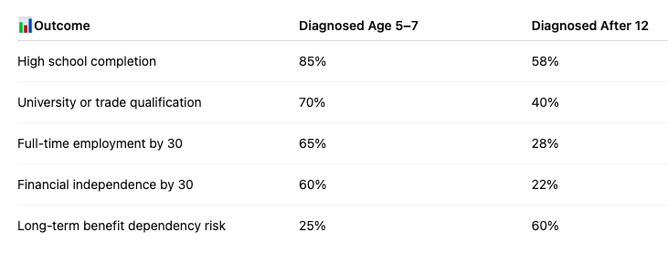How This Can Shape Their Financial and Emotional Future – And How Private Health Insurance Can Help Cover It.
🧩 Why Early Diagnosis Matters (and Why It’s Often Missed)
In 2025, we’re finally talking more openly about mental health. But there's still an uncomfortable silence around early childhood diagnoses like OCD and Autism Spectrum Disorder (ASD) — especially when it comes to girls.
Why? Because these neurodevelopmental conditions are often mislabelled, misunderstood, or missed entirely — leading to lifelong consequences in emotional wellbeing, education, career, and even financial independence.
According to Andi Putt, a U.S.-based paediatric speech-language pathologist and creator of The Autism Handbook, early recognition and neurodiversity-affirming support can significantly change a child’s long-term trajectory.
👦👧 Spotting the Signs in Young Children (Ages 4–7)
Here are common, often-overlooked traits in children with Level 1 Autism or OCD:
🌪 Obsessive-Compulsive Disorder (OCD)
Rigid routines and rituals (e.g., tapping, checking, lining things up)
Fear of contamination or “bad things happening”
Emotional distress when interrupted
Perfectionism or “magical thinking”
🧩 Autism Spectrum Disorder (Level 1)
Strong need for sameness or control
Trouble with flexible thinking or transitions
Social scripting (repeating learned phrases to “fit in”)
Sensory overload (tags, noise, light)
📘 Advanced Skills That Can Be Misleading: Hyperlexia and Hypernumeracy
As Andi Putt outlines, some neurodivergent kids develop exceptional abilities early on — often mislabelled as solely "giftedness":
🔤 Hyperlexia
Reads fluently at 2–4 years old
Obsessive interest in letters, signs, books
Strong decoding skills but poor comprehension or interaction
🔢 Hypernumeracy
Fixation with numbers, dates, calendars
Exceptional memory or math ability
Struggles with social-emotional reasoning
These “splinter skills” can mask autism, especially in high-functioning children. They are superpowers — AND they’re signals.
👧 Masking in Girls: The Invisible Struggle
Girls and AFAB (assigned female at birth) children are statistically diagnosed later than boys — often due to masking, or camouflaging symptoms to fit in socially.
Common signs:
Imitating classmates’ facial expressions, body language, or speech
Hiding stims or meltdowns until they’re home
Playing “normally” but controlling every aspect of the game
“She’s just shy.”
“She’s a perfectionist.”
“She’s so well-behaved at school but loses control at home.”
These can be blatant red flags in disguise. Learn more about how girls mask autism from Andi Putt’s community education work.
🕰️ Why Early Diagnosis Matters for Lifelong Independence
According to OECD's Neurodiversity Report (2024) and Autism NZ:
When undiagnosed, children with ASD or OCD may struggle with:
Planning and budgeting
Career consistency - many end up not wanting to work at all
Relationship stress - can't regulate emotions and makes it their partner's problem to "make things better".
Mental health crises - there's always SOMETHING that they are not happy with.
Early recognition provides access to speech therapy, occupational therapy, CBT, and executive function coaching — all of which support emotional regulation, self-advocacy, and long-term independence.
🧾 Client Story: How One Parent Used Private Health Insurance to Intervene Early
Emma, a working mum in Auckland, had suspected something for over a year. Her daughter was memorising movie scripts, lining up her toys, and panicking if her routine changed. She was social — but only by mimicking other kids. And Emma admits the truth was uncomfortable to face.
“I knew deep down something was different — but it was confronting as a parent. My only regret is not acting sooner. I let my ego get in the way. If I’d stepped in earlier, she would’ve had more support before turning seven.”
Eventually, Emma booked a private assessment with a child psychologist — and the diagnosis was Level 1 High-functioning Autism with OCD traits.
Thanks to health insurance policy, the assessment and follow-ups (worth over $2,300) were fully covered under their complimentary mental health benefit, with:
No excess
No wait time
No out-of-pocket cost beyond her premiums
“These days, I encourage other parents — don’t wait. You’ve got nothing to lose and everything to gain.”
This one decision allowed Emma to access therapy, coaching, and a clear pathway forward — completely changing her daughter’s developmental journey.
💚 How The Right Health Insurance Policy Can Help Your Family
With the right health insurance policy, you can receive up to $2,500 per policy year for:
Registered psychologist or psychiatrist consultations
No excess or wait periods for this benefit
Applies to children and adults on the policy
💬 Final Thoughts.
At Vive, we believe mental health and financial wellbeing go hand in hand. The sooner your child gets the right diagnosis and tools, the better chance they have of growing into a financially and emotionally empowered adult.
You are not overreacting. You are advocating.
Got questions about private health insurance?
Need help choosing a policy that protects your whole whānau?
📩 Book a 15-minute chat with us – we’re here to help.



